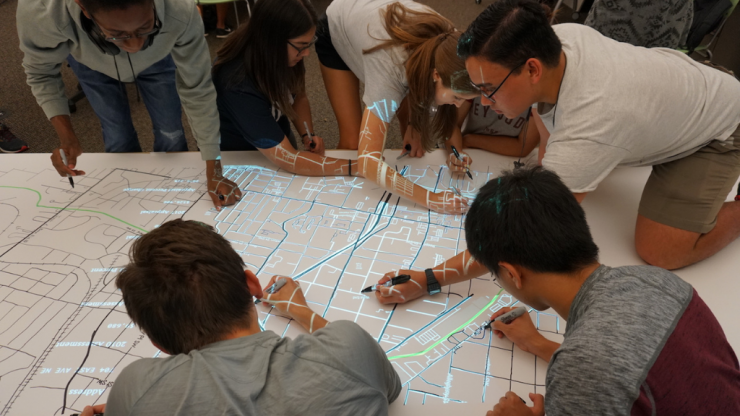Interdisciplinary Team Awarded $1 Million NSF Grant for Youth Advocacy and Disaster Resilience
Sep 21, 2021 — Atlanta, GA

The National Science Foundation (NSF) has awarded a $1 million Stage 2 Civic Innovation Challenge (CIC) grant to the Georgia Tech-led project “Visualizing Resilience: BIPOC Youth advocacy through Mapmaking.” The interdisciplinary team of researchers previously received a $50,000 grant through Stage 1 of the CIC for the first iteration of the project, “Co-Creating Data for Disaster Resilience with Historically Marginalized Communities in Savannah.”
With the new funds, they will develop “a creative toolset for education and advocacy,” said Yanni Loukissas, associate professor in the School of Literature, Media, and Communication, one of two Ivan Allen College of Liberal Arts faculty members on the project. The team will work to help residents in environmentally vulnerable communities reimagine disaster resilience and advocate for these interventions in their neighborhoods.
The collaborative effort also includes principal investigator Allen Hyde, assistant professor in the School of History and Sociology; Nisha Botchwey, associate professor of City and Regional Planning and associate dean of academic programs at Georgia Tech Professional Education; Philip Omunga at Savannah State; and Mildred McClain and Dawud Shabaka at the Harambee House, an environmental justice group in Savannah, among others. The City of Savannah Office of Sustainability has also been a long-term partner for this project.
Mapmaking to promote youth advocacy for disaster resilience
The team will use mapmaking to promote youth advocacy for disaster resilience by pairing a digital civics tool they created called Map Spot with their innovative Youth Advocacy for Resilience to Disasters (YARDs) curriculum in after-school programs for Black, Indigenous, and People of Color (BIPOC) middleschool children.
“The Youth Advocacy for Resilience to Disasters (YARDs) curriculum empowers local youth to identify environmental concerns that threaten their 'yard’ or community, create evidence-based, collaborative resilience plans to prevent or mitigate their effects, and present those plans to local government officials and policymakers,” said Botchwey. “The youth are leading these efforts to create a future they see, they map, they plan."
The pilot program will take place on the west side of Savannah, a historically Black coastal community facing the dual challenges of environmental disasters and social inequity. Over 12 sessions, or a few months, the students will complete the YARDs curriculum and participate in interactive mapmaking techniques. The curriculum delivery is a blend of face-to-face and technology learning tools employed to maximize student engagement and community impact.
“We argue that participating in advocacy work can help youth increase self and collective efficacy, as well as connect them to a broader network of potential allies and advocates,” said Meaghan McSorley, a Ph.D. student in City and Regional Planning who played a significant role as the project manager and a coauthor for the proposal. “In addition to the potential for infrastructural change, these social and individual psychosocial changes, in themselves, can enhance resilience.”
“2020 and 2021 have been a wake-up call for disasters of all types, from hurricanes to flooding to wildfires to drought to Covid-19,” said Hyde. “This is the current reality, and we need to better prepare and become more resilient.”
The researchers hope to show how the skills the youths build through the YARDs curriculum and the relationships they form with the Harambee House and the City of Savannah can strengthen the community’s resilience to environmental disasters. Thus, “the project will model how universities, community-based organizations, and local governments might prioritize youth as they seek to understand and support frontline residents,” they explained in the project summary.
Harnessing social science and the humanities to combat climate change
The grant is further evidence of the growing importance of social science and humanities researchers in helping solve problems related to climate change, said Aaron Levine, associate dean for research and outreach in the Ivan Allen College of Liberal Arts.
“Technology alone cannot solve these massive problems, and it’s gratifying to see the NSF supporting the work of Hyde, Loukissas, Botchwey, and their colleagues here at Tech and in the community to develop tools that will strengthen the ability of often marginalized communities to advocate for change and withstand the worst effects of environmental and climate-induced disasters," Levine said. "This work truly represents Georgia Tech’s mission to develop leaders who advance technology and advance the human condition.”
That's exactly what they aim to do, the team explained, by engaging youth now to equip them with the tools they need to change the world — starting with the one right outside their front door.
“We hope that this helps cultivate a new generation of leaders that are empowered to make positive social change in their community and prepare for a future that is resilient to the many disasters that threaten coastal communities in the 21st century,” said Hyde. “Our goal is to ensure that the marginalized communities most severely impacted by climate events are the central voice in the conversation for solutions.”
In addition to NSF, CIC was also supported by the U.S. Department of Energy, the U.S. Department of Homeland Security, and the MetroLab Network. The MetroLab Network is composed of more than 30 city-university partnerships, including Georgia Tech, which is a founding member.
Related Links:
- Project Summary
- More information about each of the Stage 2 Awards (NSF), including project videos and team interviews.
- Civic Innovation Challenge awards support community-based solutions to mobility and disaster resilience (NSF)
- Ivan Allen College Faculty to Study Disaster Resilience in Historically Marginalized Communities (Stage 1 announcement)
Di Minardi
di.minardi@gatech.edu




